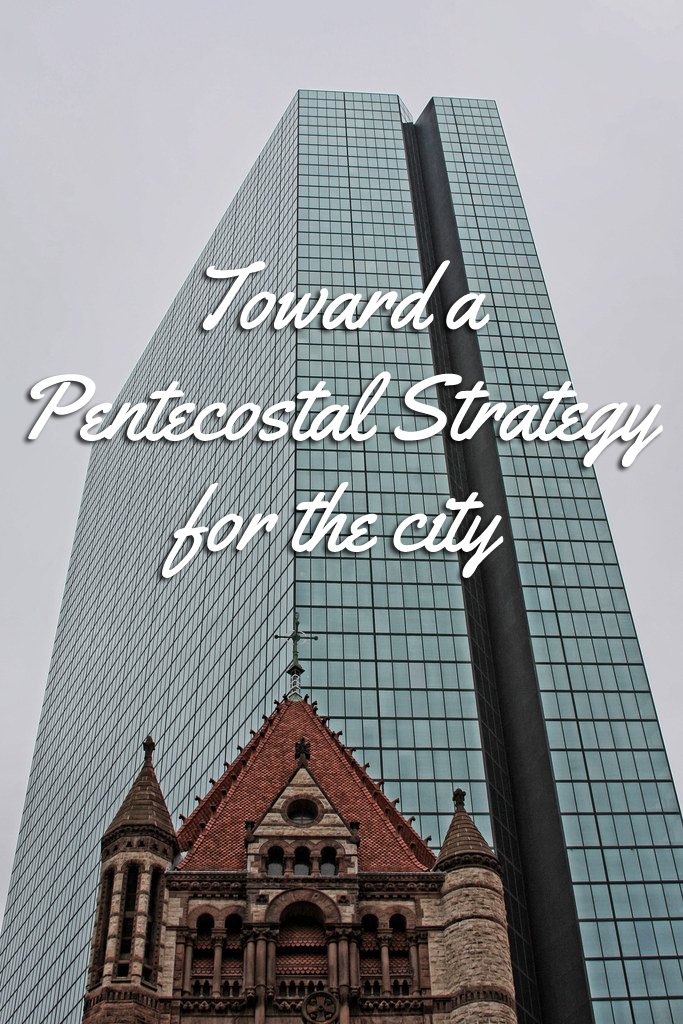Toward a Pentecostal Strategy for the City
Toward a Pentecostal Strategy for the City
One of the questions that seems to come up in this course discussion is how to change the world around us with a more positive and effective approach toward using the Gospel of Salvation. In this particular module, the difficulty addressed is ethnocentricity. The particularity of our search then arrives at the more detailed question, how can we change the culture (respectively subcultures) of our church congregations? This is a drastic move from a closed circle toward an outreach community that many congregations are unable to accomplish. How do we then empower such congregations to be transformed into cultural reach-outs to a single ethnos or multiple ethnic groups?
Problem
The problem in the first quarter of the 21st century has been incongruity of our church strategy with the times we live in and the mindset they occupy. We’ve been preparing the church for the multicultural battle, all and while we should have been equipping the saints how to rebuild the walls since the battle has been lost.
We’ve been equipping leaders for the ministry while the church ship has been sinking only to end up with well trained captains of a sunken fleet. And in a doomed attempt to reconcile the reality of the ministry with their training, they have turned to wave walkers who briefly surface for breaths of fresh air during Sunday worship only to return to the deep blue walk of their daily ministry never finding their lost piece of eight.
For the battle was lost long ago before the present generation of ministers ever came to existence. They know not the battle. They’ve only seen the ruins that were left within the broken walls of the church. And they have been struggling to reconcile the incomputable of what church eldership has been teaching them to battle against with the Nehemiah calling for restoration, which God has placed upon them. For the answer has never been in building a New Jerusalem for a fresh start, but restoring the old Jerusalem and its former glory to a new state that reclaims our history and heritage.
Context
Recent analysis of migrant churches in the United States reveals that the predominant majority of them are located in cities which have a high influxation and concentration of immigrants. Such localities are called “gateway cities”. Immigrants typically enter the United States through one of these cities and settle there. These areas contain over half of the foreign-born population in the United States as follows:
- New York, NY – Foreign born population 18.7%
- Los Angeles, CA – Foreign born population 27.1%
- Houston, TX – Foreign born population 12.3%
- Washington, DC – Foreign born population 8.6%
- Miami, FL – Foreign born population 33.6%
- Chicago, IL – Foreign born population 11.1%
- San Francisco, CA – Foreign born population 20.0%
Strategy
Asking the right questions is important, but the answers cannot be generic for all ethnic groups or cultural settings. There is a strong need to be flexible and observe changes in culture, but not to change the message of the Gospel or compromise our witness. Several common things are noted in any cultural setting where our ministry is involved:
First and foremost, people of all cultures prefer to be personal with a purpose, rather than being project driven. No one longs to be part of someone else’s project. Yet, our very existence demands personal purpose, which could serve as a great cultural catalyst in a church ministry.
Secondly, cross cultural ministry is not done merely on relationships, but on being real in the relationships. The greatest halt of ministry work is when people realize the relationship with the church has not been a real one, but merely a part of a program or a paradigm.
Finally, our cross cultural model for ministry should not be just salvation oriented, but soul oriented. There is a great difference between writing down the number of saved every Sunday and actually caring for the eternal well-being of the saved souls. In fact, this is so fundamentally determinative that it should be the goal in mind of every new church plant.
The ORIGINAL Barney Creek Stones of Spurling
Even though not intending to form a new church or denomination, their rejection of Landmarkist values placed them in conflict with traditional churches in that area. Within a short period of time it became clear that they would not be allowed to remain as members of their churches. On August 19, 1886, after being barred from his local Baptist church, he and eight others organized the Christian Union at the Barney Creek Meeting House in Monroe County, Tennessee. They agreed to free themselves from man-made creeds and unite upon the principles of the New Testament. Between 1889 and 1895, Spurling organized three other congregations, all with the name Christian Union and functioning independently under Baptist polity. While this group would later disband and its members return to their original churches, the Church of God traces its origins to this 1886 meeting.
THE COMMITMENT to follow a biblical pattern of Church government has shaped the Church of God from our founding in 1886. R.G. Spurling called for Christian Union members to “take the New Testament, or law of Christ, as your only rule of faith and practice.” His invitation was to give “each other equal rights and privilege to read and interpret for yourselves as your conscience may dictate” and to sit “together as the Church of God to transact business [as] the same…” (Tomlinson, Last Great Conflict, pp. 185-86).
Birchland Ocoee Farms Offers Hub for Local Economy
Birchland Ocoee Farms, home of popular River Maze is located at 1371 US-64 in Benton, TN on the banks of the Ocoee, “where the river flows, and memories grow!” It is a family farm of four generations that is owned and operated by Joe and Dianne Fetzer. Opening day is September 21st when the Farm will host the annual Dinner by the River, a community event that showcases food that is produced by local farmers and businesses.
Among those that will participate in Dinner by the River this year are Appalachian Bee owned by Diane Raven in Ocoee, Apple Valley Orchard operated by Chuck McSpadden in Cleveland, Trew Organic Farms, owned by Bill Trew of Ocoee, Sandy Hood’s Pick-Your-Own Blueberry Patch of Benton, Blackberry Hills Bakery owned by Barbara Leonard of Old Fort, Lamon Farms owned by Randall Lamon of Cleveland, Hoe Hop Valley Farm operated by Walter and Candyce Bates of Parksville, Cookson Creek Farm in Ocoee operated by Clarence and Debbie Hair, The Rafting Goat owned by Mack Haynes of Old Fort, Sannie Mae’s Heirloom Foods of Benton, Rowe Family Farms, and Birchland Ocoee Farms. The dessert makers and event planners are Elois Ledford and Kayla Green from Bakery on Main of Benton. The chefs are Kevin and Dana Caylor of The Crepe Outdoors. Inspired by Olivia Weatherford, a portion of the proceeds go to St. Jude’s Research on Neuroblastoma and there will be a silent auction to benefit, “LIV – In The Journey”.
Opening day for Birchland Ocoee Farms’ Corn Maze is set for September 28th when J103 will be onsite. This year marks their 15th Annual Corn Maze with the theme “Trek Thru Truth in Tennessee,” the theme of their first maze in 2005. The 2019 Soybean Maze will feature Ott, the hardworking little tractor based on a story written by Jack Higgins, a member of the Polk County Hall of Fame. Other farm activities at The River Maze include: Pumpkin Patch, Hayrides, Cow Train, Corn Cannons, “Spookey Maze”, “Farm Chores Frenzy,” Barnyard Basketball and Football, Flume Zoom and Team Building activities.
Music on The River, a fundraiser to benefit all Polk County Public Libraries will also be held at Birchland Ocoee Farms. This event will take place October 3rd at 6:00 pm. It will feature dinner, live music from local musicians and silent auction. Tickets can be purchased at West Polk Public Library in Benton. On Sunday October 13th Savannah Renfro Photography will be having a Pumpkin Patch Mini Photo Shoot Sessions. You can contact Savannah to reserve your spot today at (423) 715-9983.
For more information about hours of operation and special events that Birchland Ocoee Farms offers, you may text or call us at (423) 650-0710 or 423-650-7224. You may also email them: [email protected] or [email protected]. This Fall, let’s all show our support of the local economy.
VBS for Adults
For reasons obvious to most of our readers, I was able to attend no less than 10 (ten) VBS/Kids crusades this summer. Seven Baptist, several Pentecostals and a Methodist one.
The themes ranged from jungle journey and the Lion King to giddy up cowboys and cowgirls and world/planet/time travelling. All cool themes with lots of props and much careful preparation all in the name of bringing the Good News to the little ones. A noble cause truly worthy of any expense and labor for any church out there.
Time and length ranged from one whole day or one evening service to three nights and even several week long ones. For most of it, the ones held in most Baptist churches were designed by LifeWay and were well structured with kids constantly moving from station to station. The rest were somewhat free style, but still designed with the expectation of lots of children attending. In between each module there was candy, snacks or even a full blown supper.
The location of each VBS and the way it was designed for the crowd flow made the initial impression important. Signs welcoming and directing newcomers were grate, but the friendliness of the people made up for less signage and more human touch. Registration was a must and parents’ preferences were not taken lightly. The decorations of each room helped the children adjust to the new setting and work through the set curriculum. And yes, lots of kids made lots of mess so cleanness in class rooms, play areas and bathrooms were tended to. Some churches had a designated team that made sure the facilities were clean for the next group. And where cleanness was not intentional, it was observed that many parents did not return with their children.
Most VBS programs were designed around age groups. Some included even classes for toddlers and several had adult classes too. The ones that did not, included a family night toward the end of the week for parents to attend. A family night was a great feature for parents who did not attend but dropped their kids every night and picked them up afterwards. They were addressed with materials and opportunities for a spiritual renewal.
The thematic VBSs progressed with learning daily and build up on the previous day. The groups of children toggled between Bible lesson, crafts, games and lots of music. Kids were greatly encouraged to participate and learn the songs and dancing, recite Bible verses and answer questions from the covered material. Some parents participated too.
Prayer was made a central focal point for most of the VBSs observed. The Baptists ones, especially, had pledges of allegiance at the start of the service and assembly with prayer toward the end. A memorable experience for all children who enjoy social setting, making new friends and learn the Bible.
Here are several take ways to observe for a VBS in your church:
- Prepare for lots of children – if you have it they will come
- Train your workers. Form teams for each task. Assign measurable goals to ensure smooth moving through the program
- Self designed VBS programs work as good as the paid ones, as long as designed with the children and families in mind
- Chose the length of the event carefully with regard of your constitutions. For the most of it, less is really more.
- Do not underestimate friendliness, cleanness and the safety of the children.
- Don’t miss a family day. Everyone likes hot dogs and water slides on a hot summer day.
This goes without saying, but focus on God – it is easy to lose track and purposes in the larger design of such events.
Bulgarian Orthodox Church deletes controversial opinion on National Strategy for the Child from website
A controversial opinion purported to be from the Bulgarian Orthodox Church’s Holy Synod urging a ban on terminations of pregnancy, for religion to be a compulsory subject in schools, no sex education, and opposing the full ban on corporal punishment in schools, has been deleted from the church’s official website.
The opinion, posted in response to the Bulgarian government’s draft National Strategy for the Child 2019-2030, had not been voted by the Holy Synod, nor approved by the church’s Patriarch Neofit, nor signed by the Metropolitans, Bulgarian National Television (BNT) reported.
It had been sent for posting on the website by Gavriil, the Metropolitan of Lovech, BNT said.
After it appeared on the website on February 8, the opinion – widely covered in the Bulgarian media – caused extensive negative reaction on social networks.
Specialist church news website Dveri said that the opinion had not been considered and approved by the Bulgarian Orthodox Church’s governing body, but was an initiative of the Synod’s cultural and educational department headed by Metropolitan Gavriil.
Dveri quoted a statement by Naum, the Metropolitan of Rousse, who said that the document had not been officially discussed by the Holy Synod.
“The ‘opinion’ binding the Bulgarian Orthodox Church Holy Synod as an institution was a project personally created by Ms Dessislava Panayotova, an associate of the cultural and education department of the Synodal office…that does not mean that the Holy Synod will accept it unhesitatingly and unambiguously,” Naum said.
“The Bulgarian Orthodox Church, as a nutritionist of Bulgarians and moral values in the Bulgarian family, always will promote ethical norms in education, but will not tolerate in any way violence against children, in whatever form, especially if it is linked to so-called ‘religious education and training’,” he said.
Issues related to termination of pregnancy and children at risk are issues for future profound reflection in Bulgarian society “addressing appropriate reflections on God’s will, the dignity of the mother, as well as the significance of each specific case, related to domestic violence and violence specifically against women,” Naum’s statement said.
“All other topics concerning the education and upbringing of Bulgarian children should be discussed by relevant educators and specialists, who also have the view of theological science, thus defining the most accurate and correct approach for future recommendations on the issues raised,” the statement said.
Global Network of Bulgarian Evangelical Churches outside of Bulgaria (2019 Report)
 Bulgarian Evangelical Churches in the European Union (2019)
Bulgarian Evangelical Churches in the European Union (2019)
- Bulgarian Evangelical Churches in Germany
- Bulgarian Evangelical Churches in Spain
- Bulgarian Evangelical Churches in England
- Bulgarian Evangelical Churches in France
- Bulgarian Evangelical Churches in Belgium
- Bulgarian Evangelical Churches in Italy
- Bulgarian Evangelical Churches in Cyprus
- Bulgarian Evangelical Churches in Crete
Bulgarian Evangelical Churches in America (2019 Report)
- Bulgarian Evangelical Churches in Chicago (2019 Report)
- Bulgarian Evangelical Churches in Texas (2019 Report)
- Bulgarian Evangelical Churches – West Coast (2019 Report)
- Atlanta (active since 1996)
- Los Angeles (occasional/outreach of the Foursquare Church – Mission Hills, CA)
- Las Vegas (outreach of the Foursquare Church – http://lasvegaschurch.tv)
- San Francisco (occasional/inactive since 2012, Berkeley University/Concord, CA)
Bulgarian Evangelical Churches in Canada (2019 Report)
- Toronto (inactive since 2007)
- Toronto/Slavic (active since 2009)
- Montreal (occasional/inactive since 2012)
CURRENTLY INACTIVE CHURCHES/CONGREGATIONS:
- New York, NY (currently inactive)
- Buffalo, NY (occasional/inactive)
- Jacksonville, FL (occasional/inactive since 2014)
- Ft. Lauderdale / Miami (currently inactive)
- Washington State, Seattle area (currently inactive)
- Minneapolis, MN (occasional/inactive since 2015)
READ MORE:
- First Bulgarian Church in Chicago Opened in 1907
- Gateway Cities for Bulgarian Evangelical Churches
- How to Start a Bulgarian Church in America from A-to-Z
- Unrealized Spiritual Harvest as a Paradigm for Cross-Cultural Ministries among Migrant and Disfranchised Ethnic Groups in America Today
Bulgarian Pentecostal riddle…
Five kings with five crowns
Four bishops and castle in the middle
Who will blow the whistle
and who will play the fiddle?
A Bulgarian Pentecostal riddle…
Evangelical Education in Bulgaria is at Halt
With the new Bill on Religion in Bulgaria, the Muslim community has been given amnesty on some $4,500,000 of public debt, while granted another $3 million in annual government subsidies. As a result, the monthly salary of Muslim clergy (imams) has already increased with 20% and a new Islamic school is being opened in one of the historically oldest Christian places in Bulgaria, the city of Sliven. All while, the evangelical protestant communities are not receiving financial support under the new law and their schools remain without proper government legalization via the Bulgarian Ministry of Education.
Though this legal precedent follows the Russian Law on Religion that has already effectively closed the evangelical seminaries in Moscow, it is manifesting a political agenda undergoing in Bulgaria for over a decade. What remains unsaid with the recent changes in the Law of Religion in Bulgaria is the ultimate halt of evangelical education in the country. The Bulgarian Evangelical Theological Institute has been functioning at its operational minimum for years now. Students are trained mainly online or via small local groups spread in various cities. They are called to the school departments only for graduation or occasionally lectures by visiting scholars. Even after years of waiting, the Institute was never granted official accreditation through Bulgaria’s Ministry of Education and most of the students preferred getting their degrees from other accredited and licensed institutions. Less than 1% of the students who were not in ministry at the time of their enrollment entered the ministry post graduation. And even fewer of them remain in ministry today; which ultimately ensures the lack of adequately trained ministers for placement in the evangelical churches of Bulgaria.
The last Bulgarian to graduate from the Church of God Theological Seminary did so over a decade ago, and 2009 was the last class of the Bulgarian Theological College (seminary). One of the greatest mistakes made was closing the college in 2009, thus leaving the movement with virtually no higher ministry training for the last decade.
We were present at the national meeting of elders on September 10, 2009 in Sofia when the final decision to close the Church of God Theological College was voted. Only a few others along with us disagreed with the vote and pleaded with the assembly to make everything possible and keep the school open. At the final vote, it came down to a few thousand dollars due in annual membership fees and the school was closed.
Five years prior to these events in 2004, we published an article on evangelical education in Bulgaria with some warnings. The article proposed a change of the evangelical educational paradigm in anticipation of new legal changes and the prolonged waiting for a governmental accreditation. In fact, the same issues addressed in our proposal repeated themselves in 2016 upon Russia changing its own legislation on religion and religious education thus effectively illegalizing evangelical seminaries and overall missionary work. Today, similar legal measures are put in place by the Bulgarian government as well.
The final of our 10-point proposed plan in 2004 included the following observation:
- Naturally, the well-educated graduates have chosen not to occupy themselves with denominational politics both to avoid confrontation and to express their disagreement. This dynamic has been partially ignored by leadership remaining from the period of the underground church when religious education was virtually nonexistent and lacking a complete realization of the power of education. This unnoticed trend, however, endangers Bulgarian Evangelism creating a lack of continuity within the leadership and preparing the context for the emerging leadership crises.
With the new Bill on Religion in Bulgaria closely following the effective closure of evangelical seminaries in Moscow, the opportunity for a government recognized ministerial training in Bulgaria may be legally impossible to regain. In the light of those resent changes, our 2004 proposal for a legal ministry training alternative was successfully implemented and used for our Master of Chaplaincy Ministry graduates since 2009 providing a single valid alternative for evangelical education in Bulgaria.
NEW elections in BULGARIA (2019)
Government Elections in Bulgaria (2005-2019):
 2005 Parliamentary Elections
2005 Parliamentary Elections
2006 Presidential Elections
2007 Municipal Elections
2009 Parliamentary Elections
2009 European Parliament elections
2011 Presidential Elections
2011 Local Elections
2013 Early parliamentary elections
2014 Early Parliamentary Elections
2015 Municipal Elections
2016 Presidential election
2017 Parliamentary elections
2019 European Parliament election (23-26 May)
2019 Bulgarian local elections
New Revision of Religion Bill Voted in Bulgaria
The new Religion Bill (aka Denominations Acts) was voted in on the last working day of 2018 by the Bulgarian Parliament. At the beginning of the parliamentarian season, on January 31, 2019 Parliament considered several new corrections to the just voted-in bill as follows. Those new corrections were all voted in on Friday and allowed for:
- Between $15-40 million in stipends for the Eastern Orthodox in the form of salaries
- Some $400,000 will be provided to the Muslim confession
- Additional $5 million were allocated for the so called “Religion” Directorate – a government agency that will oversee all religious activities, sermons, visitors, finances and otherwise religious business in the country
Additionally, a one time tax amnesty would be given to various confessions at $ 5.2 million, as $ 5.1 million of this amount goes to the Muslim confession. Some sources cite that with interest of years past, the Muslim confession actually owes the state over $10 million and European Union organisations have been summoned to intervene to this “tax amnesty” as being illegal to the current code.
One reason for this is some $20 million in annual income the Muslim confession collects annual from renting properties, which should be sufficient to pay their tax. Just for comparison, at one time our building in Sofia owed $90,000 in waste tax, but was quickly summoned to pay it. But this is not the scary part just yet!
This rather large government stipend of roughly $50 million annually is designated in the government budget as “Orthodox and Muslim confession” (singular). Such in Bulgaria does not exist, except if administrative merge of those religions is meant by the government with the current legislation. There has been lot of talk that the great tax exemption toward the Muslim confession has been done in order to secure ethnic peace on the Balkans and to some extent, Muslim religious leader are confirming this in recent days. Additionally, after meeting with the Eastern Orthodox patriarch and the Muslim chief mufti this week, the Bulgarian Prime Minister stated that:
“The Bulgarian state should pay for its Bulgarian churches/confessions … in order to prevent foreign intelligence from dividing our nation.”
Such rhetoric seems to have been taken directly from the historical archives and brings the painful memory of the 1949 Pastoral Process when 15 Protestant pastors were sentences by the Communist Regime as “spies of foreign intelligence centers.” Perhaps for this reason, Bulgaria was promptly noted as one of the most intolerant countries in the Europe Union in a study by the University of Nevada, which collected survey data covering a total of 450,000 people in 100 countries.















